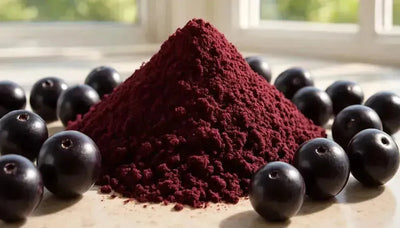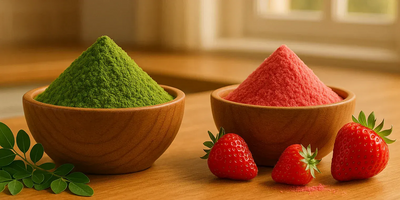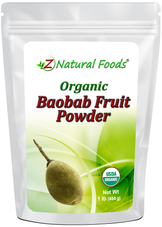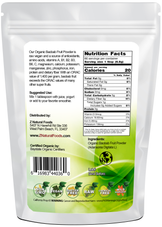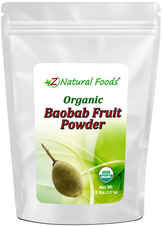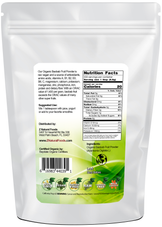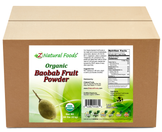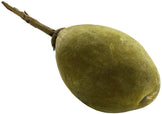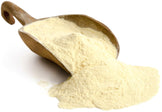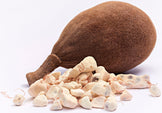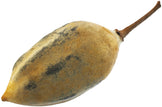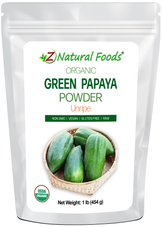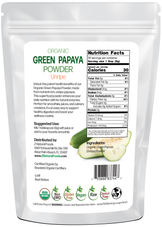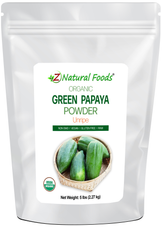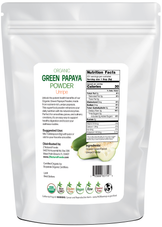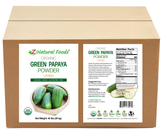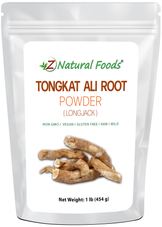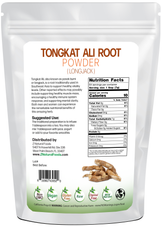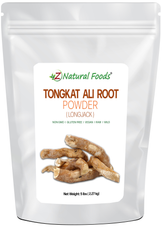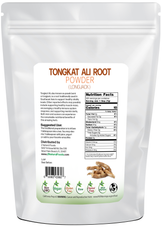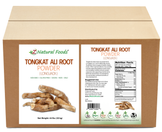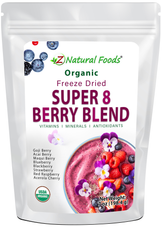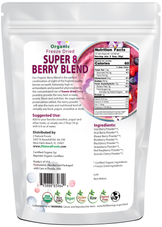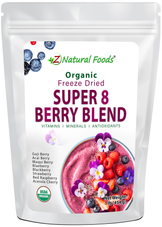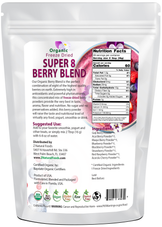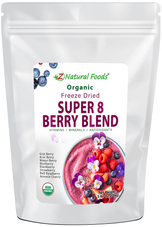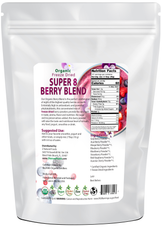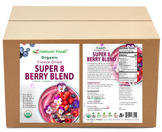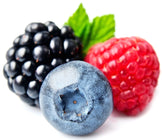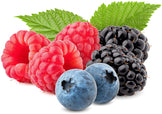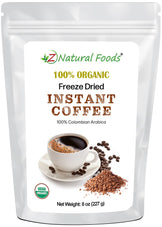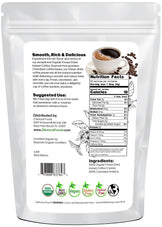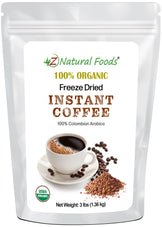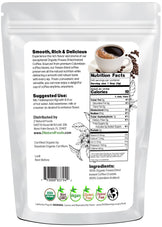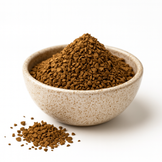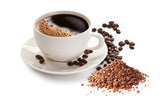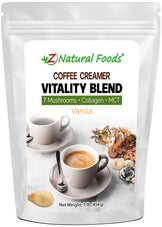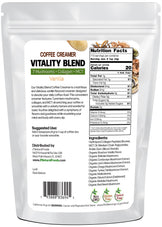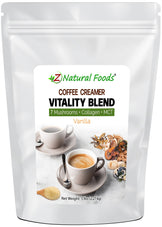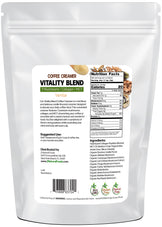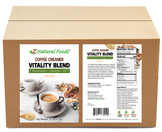Description
Description
Z Natural Foods takes pride in bringing our customers a wide range of foods worldwide in their most versatile form, and our organic baobab fruit powder is no exception.
Our baobab fruit powder is created through a careful process that involves drying and milling the fruit, preserving its natural nutrients, flavors, and other essential qualities. Baobabs' mild grapefruit-like flavor and flour-like texture generate the potential for limitless applications.
So, today, we will answer some of the most frequently asked questions we receive about baobab fruit powder.
What are some unique and fascinating facts about baobab that many people may not know?
Let's delve into the intriguing world of baobab and uncover some of its lesser-known secrets.
- Baobab is grown in 32 African countries, can live up to 5000 years, and can reach 100 ft in height and 165 ft in circumference.
- Baobab trees are believed to be prehistoric, dating back over 200 million years.
- The pulp, seeds, leaves, flowers, roots, and bark of the baobab fruit and tree are all edible.
- Bats pollinate Baobab’s flowers.
- There are nine species of baobab.
- Baobab fruit contains six times more vitamin C than oranges and six times more potassium than bananas.
- Baobab trees are unique because they contain false cavities, allowing them to grow multiple fused stems continually.
- Baobab trees are so large you can live in them. They reach heights greater than ten-story buildings.
- Fruit only begins to bear on the baobab tree when it reaches 200 years of age. WOW, talk about an investment in time….
What are baobab trees' and fruit's unique role and contribution to the environment, and do they have a special relationship with any specific species of animals?
Baobab trees are known as the Tree of Life because they provide animals and humans shelter, food, and water. The trunk of a baobab tree can store up to 26,000 gallons of water. Many animals, like monkeys and warthogs, rely on the nourishing qualities of baobab.
However, African elephants are the only animals with a special relationship with the baobab tree and fruit. While elephants rely on the water that collects in the massive trunk of the baobab tree, the spongy soft bark when water is scarce, and its highly nourishing fruit, they actually give back to the baobab tree. When elephants eat the baobab fruit, they swallow everything, including the seeds. As it moves through the digestive system, the juices soften the hard coat of the seeds. The seeds and other digestive components are disposed of in a large pile of dung, creating ideal conditions for germination.
Elephants are known to cover long distances during migration and don’t drop dung next to parent generations of baobab trees, thereby contributing to baobab’s broad distribution.
What are the health benefits of Baobab Powder?
Baobab fruits are well known to be a quality source of polyphenolic compounds.
The following was stated in an article in Applied Sciences discussing the bioactive Compounds and Scavenging Capacity of Baobab Fruit Pulp Extracts against ROS and RNS of Physiological Relevance.
- The pulp of baobab fruit is acknowledged to be a valued source of phenolic compounds like rutin, quercetin, catechin, gallic acid, and proanthocyanins.
- Baobab pulp contains more polyphenols and vitamin C than similar commonly eaten fruits (kiwis, strawberries, oranges, and apples).
However, the baobab fruit also has two specific benefits that stand out:
1) Resistant Starch
Baobab fruit, along with green bananas and unripe papayas, belongs to a unique group of foods known as resistant starches. These are dietary starches that do not break down into sugar and resist digestion in the small intestines. Instead, they pass through most of the digestive system unchanged, ending up in the colon, where they ferment and feed the microbiota. This unique property of resistant starches specifically benefits gut health, creating a cascade of incredible effects on overall well-being.
The following was stated in a randomized controlled study examining the effects of baobab fruit on reducing starch digestion and glycemic response in humans. “All extracts in this study were good sources of polyphenols. Baobab fruit extract added to white bread at 1.88 % significantly (P < .05) reduced rapidly digestible starch from white bread samples.”
2) Prebiotics
We can’t speak about resistant starches and gut health without delving into prebiotics and the potential that baobab has shown in preliminary studies. This area of study is consistently evolving as the list of foods containing these various fibers grows.
Furthermore, what was once believed to be a component of insoluble fiber is now also seen in soluble fibers. To be considered prebiotic, dietary carbohydrates must
- Resist gastric acidity, gastrointestinal enzymes, and absorption
- Get fermented by intestinal probiotic microflora
- Selectively stimulate the growth and activity of probiotics.
Baobab is building strong evidence to fit the bill as a prebiotic food.
How can Baobab Powder be used?
Like many other powders, baobab can be added to smoothies, juices, yogurts, baked goods, or even sprinkled on cereals or salads to enhance nutritional value.
However, due to its unique flavor and high soluble fiber and pectin content, Baobab has the potential to create new and exciting products and change the culinary world as a thickening and flavoring agent. Pectin, a naturally occurring polysaccharide starch from plant cell walls, is an excellent alternative to gelatin and can be used in various recipes, from jams and jellies to sauces and soups.
What does Baobab Powder taste like?
One factor most people consider essential when consuming food is taste. Let's face it; no one wants to eat something that has a bad taste. The concept of looking at flavor profiles refers to a food or recipe’s overall taste characteristics and sensory attributes with the goal of balanced synchrony on the taste buds.
Understanding this concept allows us to create a complex and delicious end product. When used correctly, changing the flavor of a dish or product is where baobab fruit has excellent potential.
Baobab fruit has a very subtle, sweet, tangy flavor, often described as a mix of pear and citrus. It makes it perfect for enhancing the taste of any beverage, sauce, and stew. A simple example is fresh lemonade, where baobab powder can add a unique tangy sweetness.
Can Baobab Powder be used in cooking to add a unique twist to your dishes?
Absolutely! Let's get creative and explore the culinary possibilities that baobab powder can bring to your kitchen.
As stated above, baobab is high in soluble fiber and pectin with a mild citrus flavor, making it a perfect addition to soups, stews, baked goods, and smoothies. For example, peanut stew is very traditional across West Africa, where the base recipe is created with a rich broth and spicy flavors.
The addition of baobab fruit powder brings a subtle tang and thickness to the dish, creating a heartier meal. Adding to a seasoning blend for dips, stir-fries, and even rice dishes will for sure take the flavor profile up a notch. However, adding baobab fruit powder to a homemade salad dressing will create a product that will take your borning salad and make a tastebud party that will have you drooling for more.
How should Baobab Powder be stored?
While there are many natural ways to dry foods and preserve their nutritional qualities, including low temperature, shade, air, sun, and freeze-drying, the quality of the raw materials predominantly determines the final product.
Ultimately, preserving the incredibly nourishing qualities found in baobab fruit is best obtained through air-drying. There are three primary advantages to using the air-drying method when creating a baobab powder.
- Air-drying creates the closest end product when presenting a whole food complex.
- Air-drying better holds a food's cellular texture (with an average water content of 1-4%) and creates a better mouthfeel.
- Air-dried foods generally allow you to customize your needs when creating a product. For example, air-dried food can be left whole, chopped, or milled into a powder. All of these will still offer the nutritional value of the fresh baobab fruit.
However, it should be kept in a cool, dry place, preferably in an airtight container, to maintain its freshness and nutritional quality.
Are there any side effects associated with Baobab Powder?
Baobab powder is considered generally safe when consumed correctly and in proper amounts. However, there is no reason to consume baobab in large quantities to acquire its nourishing benefits. The following statement is essential to understand this topic entirely.
Modern medicine has proposed that “side effects” are critical to the evaluation process. Many scientists believe that side effects are a productive way to evaluate how the effectiveness of a pharmaceutical, and for a good reason. A side-effect is defined as an adverse or rare effect outside of the primary targeted effect, but side effects are still effects. Therefore, what medicine calls side effects may be very typical for some people, but they are actually effects that may occur based on our individual responses.
In conclusion, Baobab fruit powder is a part of a unique group of foods and a most underrated whole food product that provides excellent nourishment and exceptional benefits. Baobab has a well-established background based on tradition in various cultures and a growing body of evidence supporting the fast-growing area of microbiome research, shining a light and bringing a better understanding of the complexities of this uniquely outstanding food.
For more information about our Baobab Fruit Powder, go here:
